Related Research Articles
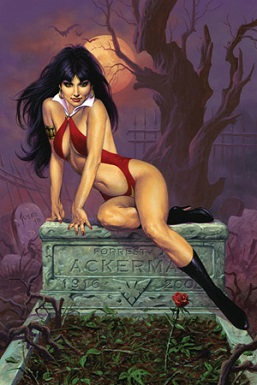
Vampirella is a vampire superheroine created by Forrest J Ackerman and comic book artist Trina Robbins in Warren Publishing's black-and-white horror comics magazine Vampirella #1, a sister publication of Creepy and Eerie.
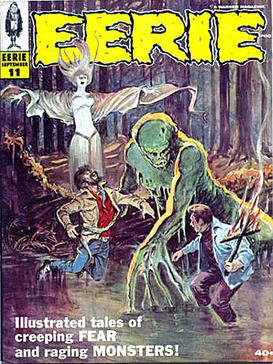
Eerie was an American magazine of horror comics introduced in 1966 by Warren Publishing. Like Mad, it was a black-and-white magazine intended for newsstand distribution and did not submit its stories to the comic book industry's voluntary Comics Code Authority. Each issue's stories were introduced by the host character, Cousin Eerie. Its sister publications were Creepy and Vampirella.
Warren Publishing was an American magazine company founded by James Warren, who published his first magazines in 1957 and continued in the business for decades. Magazines published by Warren include After Hours, Creepy, Eerie, Famous Monsters of Filmland, Help!, and Vampirella.
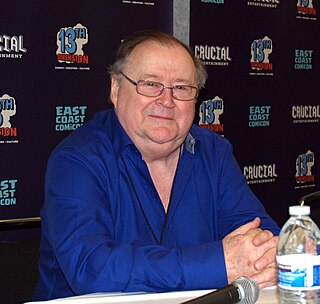
Donald Francis McGregor is an American comic book writer best known for his work for Marvel Comics; he is the author of one of the first graphic novels.
M. F. Enterprises was a 1966–67 comic book publisher owned by artist and 1970s pulp-magazine entrepreneur Myron Fass, whose holdings also included the black-and-white horror comics magazine imprint Eerie Publications.
Carl Burgos was an American comic book and advertising artist best known for creating the original Human Torch in Marvel Comics #1, during the period historians and fans call the Golden Age of comic books.

William Henderson Graham was an African-American comics artist best known for his work on the Marvel Comics series Luke Cage, Hero for Hire and the Jungle Action feature "Black Panther".
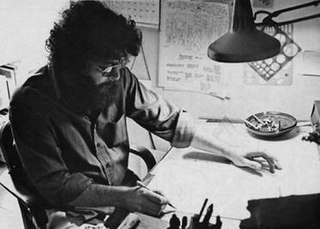
Thomas F. Sutton was an American comic book artist who sometimes used the pseudonyms Sean Todd and Dementia. He is best known for his contributions to Marvel Comics and Warren Publishing's line of black-and-white horror-comics magazines, particularly as the first story-artist of the popular character Vampirella.
Bruce Eliot Jones whose pen names include Philip Roland and Bruce Elliot, is an American comic book writer, novelist, illustrator, and screenwriter whose work included writing Marvel Comics' The Incredible Hulk from 2001 to 2005.
Roger McKenzie is an American comic book writer best known for his work on Daredevil with Frank Miller. McKenzie has also written for a variety of independent comics publishers, such as Pacific Comics, Comico Comics, Sirius Comics, Pied Piper Comics, and Eclipse Comics.

Wayne Wright Howard was an American comic book artist. He is best known for his 1970s work at Charlton Comics. Although many other artists had signed their cover artwork, he became American comic books' first series creator known to be credited by the publisher on covers, with the horror anthology Midnight Tales announcing "Created by Wayne Howard" on each issue — "a declaration perhaps unique in the industry at the time".
William Bryan Dubay, also known by the pseudonyms Will Richardson, and Dube, was an American comic-book editor, writer and artist best known as editor and writer for Warren Publishing, including that company's horror-comics magazines Creepy, Eerie and Vampirella.

Carroll O. Wessler, better known as Carl Wessler, was an American animator of the 1930s and a comic book writer from the 1940s though the 1980s for such companies as DC Comics, EC Comics, Marvel Comics, and Warren Publishing.
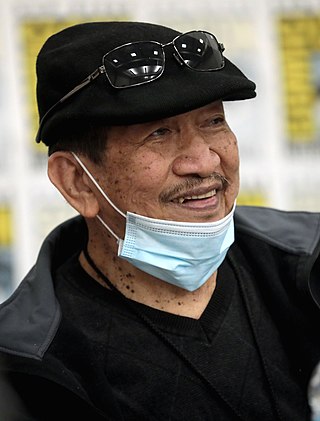
Alex Niño is a Filipino comics artist best known for his work for the American publishers DC Comics, Marvel Comics, and Warren Publishing, and in Heavy Metal magazine.

A horror fiction magazine is a magazine that publishes primarily horror fiction with the main purpose of frightening the reader. Horror magazines can be in print, on the internet, or both.
Bernard Baily was an American comic book artist best known as co-creator of the DC Comics characters the Spectre and Hourman, and a comics publisher, writer, and editor.
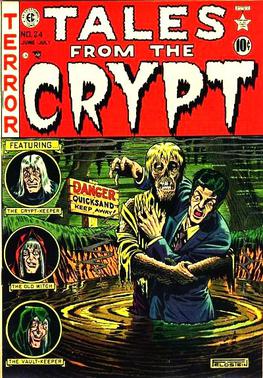
Horror comics are comic books, graphic novels, black-and-white comics magazines, and manga focusing on horror fiction. In the US market, horror comic books reached a peak in the late 1940s through the mid-1950s, when concern over content and the imposition of the self-censorship Comics Code Authority contributed to the demise of many titles and the toning down of others. Black-and-white horror-comics magazines, which did not fall under the Code, flourished from the mid-1960s through the early 1980s from a variety of publishers. Mainstream American color comic books experienced a horror resurgence in the 1970s, following a loosening of the Code. While the genre has had greater and lesser periods of popularity, it occupies a firm niche in comics as of the 2010s.

Michael W. Royer is an American comics artist and inker, best known for his work with pencilers Russ Manning and Jack Kirby. In later life Royer became a freelance product designer and character artist for The Walt Disney Company.
Farrell Publications is the name of a series of American comic book publishing companies founded and operated by Robert W. Farrell in the 1940s and 1950s, including Elliot Publishing Company, Farrell Comic Group, and Excellent Publications. Farrell is particularly known for its pre-Comics Code horror comics, mostly produced by the S. M. Iger Studio. Farrell also published romance, Western, adventure, superhero, and talking animal comics. Farrell acted as editor throughout. In addition to packaging art for Farrell from the beginning, Jerry Iger was the company's art director from 1955–1957.

Myron Fass was an American publisher of pulp magazines and comic books, operating from the 1950s through the 1990s under a multitude of company names, including M. F. Enterprises and Eerie Publications. At his height in the 1970s, Fass was known as the biggest multi-title newsstand magazine publisher in the country. He put out up to fifty titles a month, many of them one-offs, covering any subject matter he thought would sell, from soft-core pornography to professional wrestling, UFOs to punk rock, horror films to firearm magazines.
References
- ↑ Smith, Keith; Broxson, Gene M. (August 6, 2011). "Introduction". Eerie Publications: An Index and Collector's Guide. Archived from the original on May 31, 2019. Retrieved August 7, 2019.
They were also some of the most reviled, disparaged, and ignored comics ever produced. ... Eerie Publications' output was dismissed as worthless, its writing and art execrable (especially compared to rival Warren).
- 1 2 Brinkman, Tom. "Myron Fass – Demon God of Pulp". BadMags.com. Archived from the original on July 16, 2011. Retrieved August 10, 2011.
- ↑ Sacks, Jason; Dallas, Keith (2014). American Comic Book Chronicles: The 1970s. TwoMorrows Publishing. p. 31. ISBN 978-1605490564.
- 1 2 3 4 "Eerie Publications: Comix from Hell". Empire-of-the-Claw.com. n.d. Archived from the original on July 21, 2011.
- ↑ "Independent Heroes from the USA: Captain Marvel". An International Catalogue of Superheroes. Archived from the original on June 5, 2011.
- ↑ "The Dead Demons! The Claw's Eerie Publications online archive!".
- ↑ Eerie Publications at the Grand Comics Database
- ↑ Spelled with apostrophe on cover, spelled without apostrophe in copyrighted title in issues' postal indicia, per Grand Comics Database.